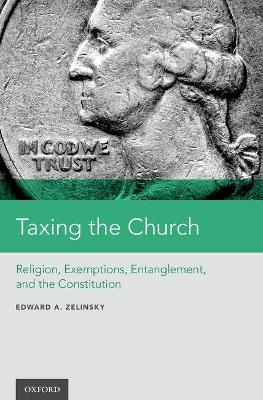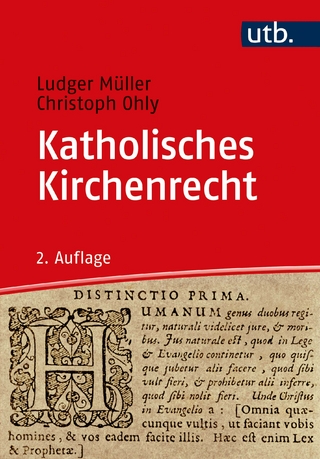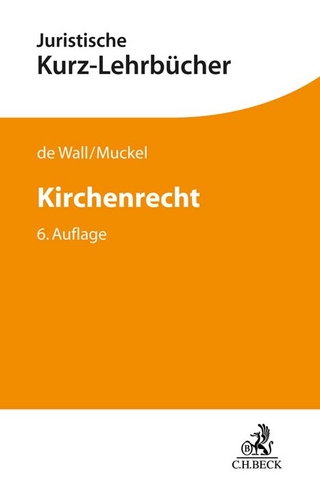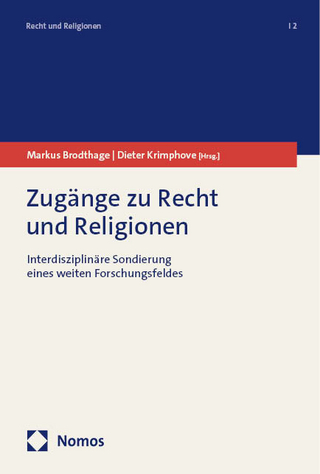
Taxing the Church
Oxford University Press Inc (Verlag)
978-0-19-085395-2 (ISBN)
Taxing the church or exempting the church involves often difficult trade-offs among competing and legitimate values. On balance, our federal system of decentralized legislation reasonably make these legal and tax policy trade-offs, though there is room for improvement in particular settings such as the protection of internal church communications and the expansion of the churches' sales tax liabilities.
Edward A. Zelinsky is the Morris and Annie Trachman Professor of Law at the Benjamin N. Cardozo School of Law of Yeshiva University where he lectures on tax law. He is a graduate of Yale College, Yale Law School, and the Yale Graduate School. Professor Zelinsky's articles have appeared in the nation's most well-known legal journals including the Harvard Law Review, the Yale Law Journal, and the Columbia Law Review. He is the author of The Origins of the Ownership Society: How the Defined Contribution Paradigm Changed America (Oxford University Press, 2007), and he is a regular contributor to the OUP blog.
Acknowledgments
Introduction
Chapter One: The Federal Constitutional Law on Taxation and Religion
A) Murdock and Follett
B) Walz
C) Texas Monthly
D) Jimmy Swaggart Ministries
E) Nyquist and Mueller
F) Lee
G) Conclusion
Chapter Two: State Constitutions on Religion and
Taxation
A) State constitutional exemptions from
property taxation
B) Interpreting "church" for property tax
exemption purposes
C) The property tax status of parsonages
D) Other state constitutional provisions
E) Conclusion
Chapter Three: The Internal Revenue Code and Religious Institutions
A) The Federal Income Tax
B) The Federal Estate and Gift Taxes
C) The FICA and Self-employment Taxes
D) The Federal Unemployment Tax
E) The Federal Health Mandates for
Individuals and Employers
F) The Code's procedural provisions
relative to churches
G) Church retirement plans
H) Conclusion
Chapter Four: State Tax Statutes and Religious
Exemptions
A) Property Tax Exemption Statutes
B) Sales Taxes: Overview
C) States subjecting churches to sales taxes
as both buyers and sellers
D) States exempting churches on sales taxes
as both buyers and sellers
E) States exempting churches as buyers but
not as sellers
F) States exempting churches as sellers but
not as buyers
G) Church sales tax exemption tied to IRS
confirmation of income tax exemption
H) Sales tax: Summary
I) State Income Taxes
J) Real Estate Transfer Taxes
K) State Unemployment Taxes
L) Conclusion
Chapter Five: Untangling Entanglement
A) The Inevitability of Tax-Related
Entanglement: Borderline Entanglement and
Enforcement Entanglement in The Courts
B) Reducing Borderline Entanglement Through
Broader Exemptions or No Exemptions
C) Enforcement Entanglement, Property Taxes
and General Income Taxes
D) Sales, Payroll and Real Estate Conveyance
Taxes: Less Prone to Enforcement
Entanglement
E) The Entangling Taxation of Unrelated
Business Incomes
F) The Entangling Trade-offs of Unemployment
Compensation
G) Entanglement, Subsidization, Tax Policy
Criteria and the Normative Tax Base
H) Why Entanglement Matters
I) Conclusion
Chapter Six: Parsonages, Parsonage Allowances and
the Religious Exemptions From Social
Security Taxes and the Health Care
Mandate
A) The Property Tax Status of Parsonages
B) The Income Tax Treatment of Parsonages
and Parsonage Allowances: Code Sections
107 and 119
C) Repealing Section 107: Swapping
Borderline Entanglement for Enforcement
Entanglement
D) Swapping One Borderline Entanglement
for Another: Section 107 v. Section 119
E) A Broader Possibility: Neither Section
107 nor Section 119 Applies to Religious Employers
F) Section 107(2) as a Matter of Tax Policy
G) The Constitutionality of the Religious
Exemptions From The Social Security Taxes
and the Individual Health Care Mandate
H) A Final Word on Lemon
I) Conclusion
Chapter Seven: Other Issues For the Future: Churches'
Lobbying, Campaigning, and Sales
Taxation
A) Section 501(c)(3)'s Bans on Substantial
Lobbying and Political Campaigning
B) The Controversy
C) A Proposal to Protect Internal Church
Communications
D) Expanding the Sales Tax Obligations of
Churches
E) Conclusion
Chapter Eight: Constitutional and Tax Policy Issues
A) The Original Understanding of the Religion
Clauses of the First Amendment:
Prohibiting a National Church v. Nonpreferentialism v. Separationism
B) Exempting Churches From Laws of General Applicability: The Relative Merits of
Judicial and Legislative Decisionmaking
C) The Criteria Governing Legislative
Exemptions from Laws of General
Applicability
D) The Rhetoric of Separationism
E) To Tax or Exempt the Profits of
Nonprofits
F) Revisiting the Unrelated Business
Income Tax (UBIT)
G) Conclusion
Conclusion
Index
| Erscheinungsdatum | 11.11.2017 |
|---|---|
| Verlagsort | New York |
| Sprache | englisch |
| Maße | 239 x 155 mm |
| Gewicht | 522 g |
| Themenwelt | Geisteswissenschaften ► Religion / Theologie |
| Recht / Steuern ► Allgemeines / Lexika | |
| Recht / Steuern ► EU / Internationales Recht | |
| Recht / Steuern ► Öffentliches Recht ► Kirchenrecht | |
| Recht / Steuern ► Steuern / Steuerrecht | |
| ISBN-10 | 0-19-085395-6 / 0190853956 |
| ISBN-13 | 978-0-19-085395-2 / 9780190853952 |
| Zustand | Neuware |
| Informationen gemäß Produktsicherheitsverordnung (GPSR) | |
| Haben Sie eine Frage zum Produkt? |
aus dem Bereich


